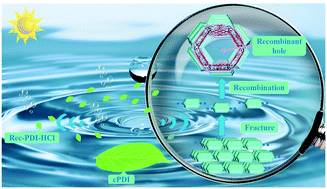Microwave-initiated recombination of hydrogen bonds of a perylene diimide supramolecule for PPCP photodegradation†
Abstract
Perylene diimide (PDI) has unique properties for the photodegradation of pharmaceutical and personal care products (PPCPs), but still shows some disadvantages in terms of its microstructure tunability and photocatalytic activity. Herein, a PDI supramolecule photocatalyst with recombined hydrogen bonds was devised via microwave technology in hydrochloric acid (Rec-PDI-HCl). Microwave irradiation boosts the fracturing and rearrangement process of –N–H in Rec-PDI-HCl, which leads to the formation of “recombinant holes” and initiates its polarization recombination stimulated by uneven intermolecular charge, enhancing the mobility of photogenerated carriers. Furthermore, Rec-PDI-HCl shows excellent stacking and self-assembly to create electron transfer channels with a high degree of crystallinity and large dipoles. Therefore, Rec-PDI-HCl exhibits high mineralization efficiency, with the degradation rate of bisphenol A reaching 81.3%, which is obviously higher compared to the rate of acommercial PDI. Rec-PDI-HCl with reconfigured hydrogen bonds exhibits a new strategy for the mineralization of PPCPs and may promote the application of other photocatalysts that have outstanding potential for environmental decontamination.



 Please wait while we load your content...
Please wait while we load your content...